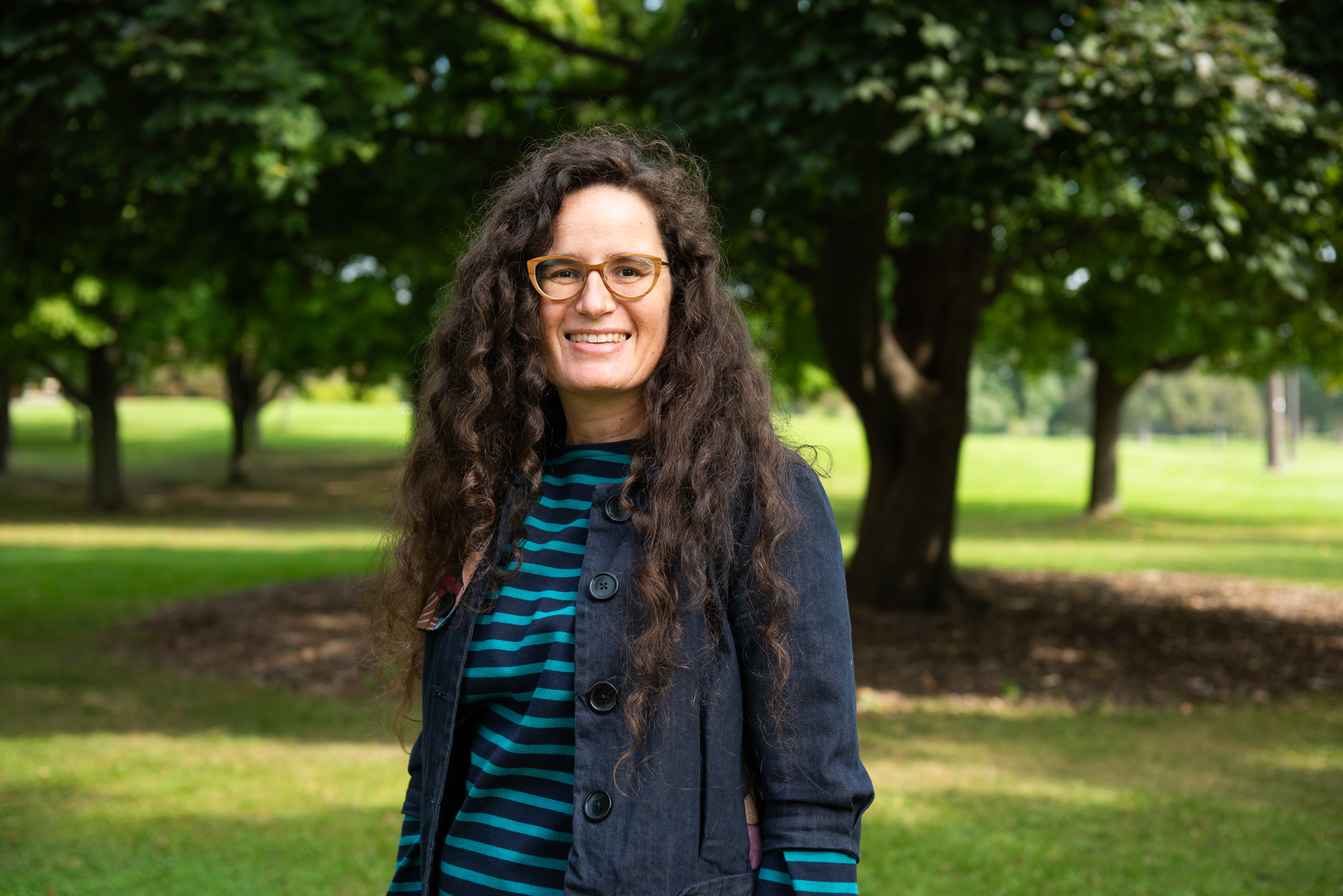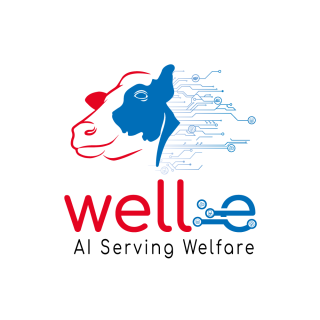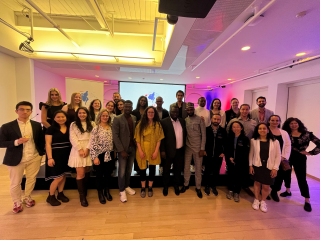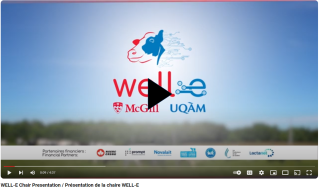
 Associate Professor
Associate Professor
William Dawson Scholar
Innovation Chair in Animal Welfare and Artificial Intelligence (WELL-E)
elsa.vasseur [at] mcgill.ca (Email) | Macdonald-Stewart Building, MS1-087 | www.cowlifemcgill.com | well-e | LinkedIn |
Degrees
BSc Agriculture, Food and Environmental Sciences, ISA Lille (2002)
MSc Rural Development (2004) ISA Lille
MSc Animal Behavior (2005) AgroParisTech
PhD Animal Sciences (2009) Université Laval
Awards and Recognitions
- Research and Innovation Chair in Animal Welfare and Artificial Intelligence (2022 - )
- William Dawson Scholar (2020 - )
- NSERC/Novalait/Dairy Farmers of Canada/Valacta Industrial Research Chair in Sustainable Life of Dairy Cattle (2016-2022)
- NSERC Postdoctoral Research Fellowship (Visiting Fellowships in Canadian Government Laboratories Program) (2010-2011)
Active Affiliations
Institutional:
- AES Program Coordinator, Global Food Security (2023-)
- AES Faculty Animal Care Committee (2023-)
- AES Faculty Academic Program Committee (2023-)
- Margaret A Gilliam Institute for Global Food Security Steering Committee Member (2020-)
- AES Farm Research and Teaching Committee Member (2020-)
- Universities Federation for Animal Welfare (UFAW) University LINKs Scheme McGill Liaison (2017-)
Scientific Committees:
- Co-chair Research Theme 1: Impact of farm management on milk quality, Op+lait group of researchers on milk quality through FRQNT strategic grouping program, Université de Montréal (2020-)
- Executive Committee Member, Op+lait group of researchers on milk quality through FRQNT strategic grouping program, Université de Montréal (2018-)
- Member of the International Society for Applied Ethology ISAE (2007-), American Dairy Science Association (2011-), and Canadian Society of Animal Science (2014-), Groupe de recherche en santé bovine GRESABO (2018-)
Industry, Institutional and Government Committees, and Consulting:
International:
- Committee Member, International Dairy Federation (IDF) Standing Committee on Animal Health & Welfare (2023-)
- Executive Committee Member, Réseau de recherche international (2RI) Galactinnov (2023-)
- Committee Member, ICAR Functional Traits Working Group, Rome Italy (2018-)
- Committee Member 2x, Welfare Measures sub-Working Group and Claw Health sub-Working Group, ICAR Functional Traits Working Group, Rome Italy (2018-)
National:
- Scientific Expert for Canadian Council on Animal Care, Assessment Program (2017-)
Provincial:
- Valacta Board Member, McGill Representative (2023-)
- Committee Member 3x, Expert Committee, Mobilisation numérique, Bien-être animal et Production biologique, led by Valacta (2020-)
Short Bio
 Elsa Vasseur is an Associate Professor in the Department of Animal Science at McGill University, William Dawson Scholar, and Co-Chairholder of the Research and Innovation Chair in Animal Welfare and Artificial Intelligence (WELL-E), alongside Abdoulaye Banire Diallo (Computer Science, UQAM). The Chair’s goal is to leverage artificial intelligence and internet of things for the improvement of human and animal welfare.
Elsa Vasseur is an Associate Professor in the Department of Animal Science at McGill University, William Dawson Scholar, and Co-Chairholder of the Research and Innovation Chair in Animal Welfare and Artificial Intelligence (WELL-E), alongside Abdoulaye Banire Diallo (Computer Science, UQAM). The Chair’s goal is to leverage artificial intelligence and internet of things for the improvement of human and animal welfare.
Much of her research centers on agricultural systems, and specifically through the lenses of food security and farm animal welfare in national and international contexts. Her research takes into account realities of farming and leverages contacts with industry stakeholders to lead the development of recommendations for best practices and novel approaches for knowledge transfer to Canadian farmers and beyond. Grounding her work in multidisciplinary collaboration, Vasseur takes both animal- and socio-economic approaches to improving animal wellbeing and longevity, farm profitability and sustainability.
Vasseur is the Program Director of Global Food Security at McGill. She is also an instructor in the Barbados Interdisciplinary Tropical Studies (BITS). Her international research and development work includes a recent UN-FAO funded project focusing on women empowerment in Senegal livestock value chains, and a CECI-led project supporting local university in research, training and knowledge transfer in agriculture in Haiti.
Research Interests
 Vasseur’s research interests cover a wide array of topics and research projects. Amongst these, work under the WELL-E chair aims to leverage AI and IoT to improve animal welfare (for animal welfare) and ultimately link animal longevity and business’ profitability, all the while developing new technologies and methods to allow for innovation in animal welfare research. Projects under the Chair will fall into four broad categories:
Vasseur’s research interests cover a wide array of topics and research projects. Amongst these, work under the WELL-E chair aims to leverage AI and IoT to improve animal welfare (for animal welfare) and ultimately link animal longevity and business’ profitability, all the while developing new technologies and methods to allow for innovation in animal welfare research. Projects under the Chair will fall into four broad categories:
Theme 1: Animal Welfare and Herd Management
This research theme will focus on the elements of the cow environment and their impact on the quality of life of cows. We will examine possible improvements to different housing systems through environmental and social enrichment, the impact of handling and access to exercise, and solutions for transitioning from tie-stall housing systems to alternative systems. Research will focus on measures of emotions, biomechanics, and biomarkers to understand cow’s psychological and physical experience. We will study, in a network of partnered farms, the impact of transitioning systems on management and animal responses, and search for ways to help cows and producers adapt more easily to a new system.
Theme 2: Animal Welfare and Longevity of Cows
Research conducted within this theme will focus on long-term profitability measures (for herds) and survival (for cows) in the dairy industry. Our previous research has clearly shown that AI, particularly machine learning, is helpful to identify early indicators of change in cow health status, which could be applied to the development of tools for detecting risks of lameness and injury. We have also shown that a machine learning approach can be used to remotely detect herds at risk of deteriorating welfare status using routinely collected data from milk recording or health records. Throughout WELL-E, we will build upon these results with specific objectives of developing predictors of longevity, welfare, and profitability.
Theme 3: Efficient and Energy-Efficient Collection of Predictive and Monitoring Data
This research theme will focus on how data is collected, aiming for faster, more efficient, and more reliable data collection across a network of partnered farms. Serving as a living digital laboratory, this theme aims to support the first two themes by providing the necessary infrastructure for scaling up. To achieve this, research will explore effective ways to provide the infrastructure and software for digitizing dairy farms. Research in this area will focus on refining this infrastructure to support research themes on animal welfare.
Theme 4: Big Data, Data Analysis, and Artificial Intelligence
This research axis will address the challenges of automating the processing of data from sensors and activity detection devices in cows and will touch on several questions. First, issues related to the integration of heterogeneous data will be addressed through ontology modeling and knowledge graphs to represent captured data from major collection sources. Algorithms will also be designed to produce prediction and prescription indicators that support decision-making. This theme will also support the first two themes by enabling the automation of some measures and the development of substitution measures, simplifying decision-making on the farm.
Courses